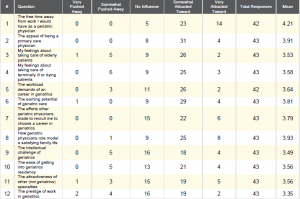Ian Christensen and Faculty Mentor: Michael Barnes, Health Science
Introduction
As of the end of August, 2013, senior citizens accounted for 11 percent of Taiwan’s population1. According to a report published by Taiwan’s Ministry of the Interior earlier this year, Taiwan’s population is predicted to be “hyper-aged”,with 20% of the population 65 or over, by 2025. With the world’s lowest birth rate (less than 0.9 children per woman)2 and a universal health care system, the aging of Taiwan’s population constitutes a massive challenge for the Taiwan health care system. Such a challenge is not, however, unique to Taiwan. Many populations, especially in developed nations such as those in Europe and, indeed, the United States, face similar difficulties as life expectancies continue to increase, birth rates continue to decline and the “baby boomer” generation ages. Taiwan has one of the fastest aging populations in the world and therefore serves as a useful model for other nations facing similar challenges3. Although the Taiwan government has done much to address this problem, shortages of doctors in key specialties associated with the care of the elderly remains a concern. This study aims to identify and assess the importance of factors associated with the specialty selection of medical students in Taiwan.
Methodology
Participants included 44 5th, 6th and 7th year medical students (Taiwan medical schools have a 7 year curriculum) and residents at the Taiwan National Defense Medical Center and were recruited with the help of Dr. Song, a nephrologist at the hospital. Survey questions focused on likely factors involved in specialty selection, with a special emphasis on factors that either pushed them toward or away choosing gerontology as a specialty. Consent was obtained through the use of an implied consent form given to the participants. Participants were allowed to withdraw from the study at any time.
Results
The majority of participants (19) were pursuing a career in internal medicine, with a minority (3) considering a specialty in gerontology. 39 participants (87%) had considered one or more specialty before settling on a final choice. 42 participants (95%) decided on their specialty sometime after their 5th year of medical school. A majority of participants (25/44) agreed that their medical school had prepared them adequately to make an informed decision about geriatrics as a career.
Question: How important were the following factors in deciding a specialty?

Question: Please indicate how much each of the following factors pushed you away from or attracted you toward a career in geriatrics.

All but two participants agreed that Taiwan’s ageing demographic was a very serious societal challenge, however most (27/43) believed that the issue would be resolved regardless of their choice of specialty; though a significant minority (9/43) disagreed.
Discussion
Due to the relative smallness of the sample size, options for statistical analysis were limited. However, there were some factors involved in specialty selection that stood out as more important than others including free time away from work (3.23/4) and family influence (3.25/4). In terms of selection of geriatrics specifically, free time away from work (4.21/5), a satisfying family life (3.93/5) and appeal of being a primary care physician (3.91/5) were the most attractive. Factors that did not seem to play as large a role included interest in working with a specific demographic (2.30/4) or the intellectual challenge of a specialty (2.41/4). The least attractive aspect of geriatrics was its associated prestige (3.35/4).
Conclusion
The fact that the majority of participants decided on a specialty after their 5th year of medical school suggests that policy makers and medical school faculty have a significant opportunity to influence decisions in this area. It is encouraging to see that one of the factors most attractive to students, free time away from work, is also perceived to be a central aspect of geriatric medicine and it would appear to be prudent to provide policy protection to this benefit, especially as demand for geriatric physicians increases. Recognition of the problem of an ageing demographic did not seem to heavily influence specialty selection and therefore it is recommended that incentives focus primarily on personal interests and benefits. Finally, although this study suggests interesting preliminary results, a more comprehensive and far-reaching analysis of the medical profession across Taiwan would allow for more concrete and generalizable results.
1Su, Justine, and Elizabeth Hsu. “Recent Population Figures Confirm Taiwan Aging Problem: Official.” FOCUSTAIWAN. N.p., 19 Oct. 2013. Web. 30 Oct. 2013.
2Jennings, Ralph. “Taiwan Birth Rate Falls to World’s Lowest.” Voice of America. N.p., 11 Aug. 2011. Web. 30 Oct. 2013.
3Hsueh, James Cherng Tay, and Yun-Tung Wang. “Living Arrangement and the Well-being of the Elderly in Taiwan.” 5th International Conference of East Asian Social Policy” in National Taiwan University, Taipei, Taiwan. Nov. 2008.
